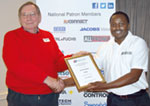
At the July Technology Evening, du Toit Grobler presented the topic ‘Professional Engineering Registration.’
The Engineering Council of South Africa (ECSA) is a statutory body established in terms of the Engineering Profession Act (EPA), 46 of 2000. ECSA’s primary role is the regulation of the engineering profession in terms of this Act. Its core functions are the accreditation of engineering programmes, registration of persons as professionals in specified categories and the regulation of the practice of registered persons.

Consequently, ECSA is the only body in South Africa that is authorised to register engineering professionals and bestow the use of engineering titles, such as Professional Engineers (Pr Eng), Professional Engineering Technologist (Pr Tech Eng), Professional Engineering Technician (Pr Techni Eng), and Professional Certified Engineer (Pr Cert Eng) on persons who have met the requisite professional registration criteria.
There are two requirements for registration:
1. Academic exit levels (educational standard = stage 1).
2. Practical/technical post qualification training at the appropriate engineering level for the category and in the discipline of registration concerned (professional development = stage 2).
Some topics covered by du Toit included:
• Eleven outcomes required.
• How and when to register as a candidate.
• Discipline specific training guides for candidate engineering practitioners.
• Engineering disciplines in which ECSA has registered practitioners to date.
• Training period.
• Training progression.
• Developing professional competence.
• Professional registration process.
• Application requirements.
• New registration system.
• Tips on the preparation of experiential and engineering reports.
• Renewal of registration.
In conclusion, it was highlighted that ECSA is the custodian of the values and ethos of the profession. As a registered professional, one should remember that the profession operates in a global environment. While it is necessary to regulate the profession, it cannot operate in isolation to the rest of the world.
The branch thanks du Toit for his informative and well-received presentation, which was followed by an interactive Q&A session.
Dates to diarise
• The branch will host the annual SAIMC Golf Day on 21 October at the Kempton Park Golf course.
• The SAIMC annual banquet will be held on 30 September.
| Tel: | +27 11 312 2445 |
| Email: | [email protected] |
| www: | www.saimc.co.za |
| Articles: | More information and articles about SAIMC |

© Technews Publishing (Pty) Ltd | All Rights Reserved